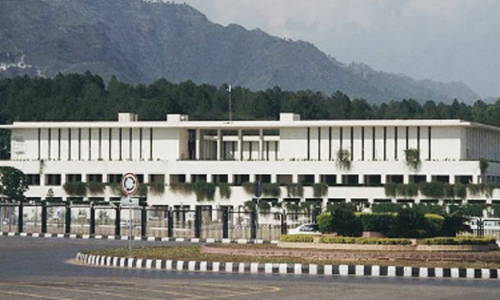ISLAMABAD: Although tasked with managing the affairs of the bureaucracy and — in turn — ensuring that the affairs of the country run smoothly, the Establishment Division itself has been violating the rules governing the transfer and posting on deputation of civil servants, documents examined by Dawn reveal.
The Establishment Division serves as the nerve-centre of the bureaucracy and its officers act as management consultants for the federal government.
In addition to dealing with postings, transfers, promotions and trainings, they are tasked with undertaking case studies to solve specific management problems, conducting organisational reviews, defining the functions and procedures of various divisions and their attached departments as well as all other federal government offices, departments, autonomous organisations, etc.
However, according to audit paras placed before the Public Accounts Committee, several officers working at the Establishment Division on deputation have overstayed their deputation period well over the five-year maximum period allowed in such cases.
These officers include officials from provincial education departments, ex-cadre and non-cadre officials and, in one instance, a veterinary doctor from Balochistan.
Moreover, as per a government audit, at least 14 officers have received “unauthorised payments” of deputation allowance — amounting to Rs5.4 million — without approval from the competent authority.
The office of the Auditor General of Pakistan has termed these appointments “unauthorised” as no notification containing the approval of a competent authority was provided to the auditors, nor were the personal files of any of the 14 officers furnished.
Therefore, auditors have ruled that their salaries should not have been paid and have recommended that the amount spent on their salary and allowances be recovered.
Violating their own rules
As per the Establishment Division’s own rules, “The normal period of deputation for all categories of government servants would be three years. This would be extendable by two years with the prior approval of the competent authority”.
The rule goes on to state that once five years have elapsed, “both the borrowing and lending organisations must ensure the immediate repatriation of the deputationist(sic)”.
“If a person is on deputation to a government organisation and has completed the maximum tenure of five years, he must revert or be reverted by the borrowing office to his parent/lending organisation… otherwise, the audit offices concerned shall not make payment of salary and allowances to him beyond the date of expiry of five years,” the Establishment Division rule states.
However, while a majority of government ministries and departments complied with these directions, the Establishment Division did not implement the same policy on its own staff.
In September 2016, the Supreme Court laid down the procedure for retaining officials on deputation as well as their absorption in the borrowing departments, with the consent of the lending department.
The apex court registrar informed the Establishment Division on Oct 27, 2017 that “officers who are on deputation will be sent back to their parent departments” and asked the federal government to review “policy with regard to deputation and appointments made by transfer to bring it in conformity with the referred judgement”.
The court provided an opportunity “to all the candidates who meet the stipulated criteria to apply for the posts of Office Management Group (OMG) against the 10pc reserved quota”.
As per the registrar’s letter, the process of selection was to be undertaken by the Federal Public Service Commission (FPSC) and the officers repatriated to their parent departments were to be given an opportunity to compete for the positions.
However, according to Establishment Division spokesperson Rafique Salik, the division had only recently initiated the process of complying with the nearly five-year-old Supreme Court directions.
According to Mr Salik, the FPSC has held exams for eligible officials who are seeking regularisation in the division. He hoped that the process would be completed soon.
Why the delay?
But here, another question arises; why did it take the Establishment Division so long to implement the Supreme Court’s orders on officers working for it?
Sources told Dawn there was an impression that since these officers had been dealing with the prime service cadres for several years their en masse departure from the Establishment Division would create a vacuum and have an adverse effect on the division’s performance.
A senior bureaucrat told Dawn that the Establishment Division wanted to retain these deputationists because it considered them its “institutional memory”.
However, according to him, this stance was rejected by the Supreme Court when the division tried to justify the officers’ overstaying their deputation period.
Published in Dawn, January 10th, 2022













































